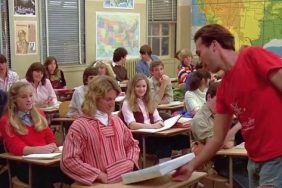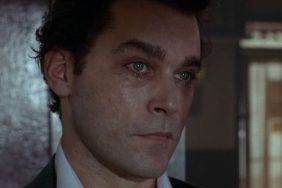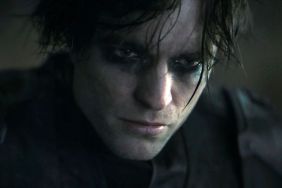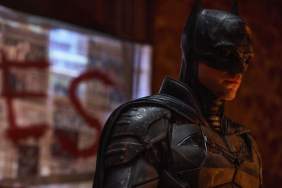Everybody talks about superhero movies, but about the bad guys? A great superhero movie almost always has a great supervillain, and sometimes – like in this weekend’s new release Suicide Squad – they even get their own movie altogether.
Also: The Best Supervillains Who Haven’t Been in a Movie Yet
We’ve already answered the question “What’s the best superhero movie ever?” so now the time has come to explore the opposite question. What’s the best movie ever made about a supervillain? We asked our panel of film critics – Crave’s William Bibbiani and Witney Seibold, and Collider’s Brian Formo – to each pick just one film to stand as the pinnacle of the genre, and as usual they couldn’t agree on a damned thing.
Find out what they selected, and come back every Wednesday for another highly debatable installment of Crave’s The Best Movie Ever!
Witney Seibold’s Pick: A Clockwork Orange (1971)

Warner Bros.
Supervillains – when such an appellation can be used – are typically employed by screenwriters and filmmakers as a dark mirror juxtaposition of a hero. They stand for ideals that are opposite of the heroes, longing for chaos and death, allowing the heroes to bring order and light back to the world. The better villains often resemble their fraternal heroes. The best villains also possess a streak of subversive “cool” which audiences tend to gravitate towards; a great villain can serve as a vicarious dark thrill for a viewer’s more subtle destructive impulses. Why do you think Darth Vader is more often celebrated than Luke? Freddy Krueger more than any of his victims?
The best films about supervillainy, however, tend to have no heroes. Villainy is, certain films argue, an all-too-natural part of the human psyche, and one can often find themselves lost in a world where heroes do not exist. Often, we see, the only option is harm, crime, chaos, murder, and death. The most horrifying villains manage to, through their own horrid dismissal of morals, induct ordinary people into a life of iniquity.
So the best movie about supervillains would likely be Stanley Kubrick’s 1971 sci-fi parable A Clockwork Orange. In the near future, a 15-year-old thug named Alex DeLarge (played indelibly by Malcolm McDowall) has managed to find his place as someone with no morals at all. He harms others, rapes women, lies, steals, and kills. His default mode is to be evil. The movie is about what happens when a society devoted to justice and peace – an immovable object – encounters a juggernaut of unchangeable wickedness – an unstoppable force. Alex is eventually “brainwashed” into feeling guilt, but this is seen as something of a tragedy. The world, the film argues, needs him to be evil in order to pretend that it is still somehow good. The very notion of justice is called into question. Justice, the film argues, only works if everyone has a generally agreed-upon moral center. And not everyone does.
Brian Formo’s Pick: Pootie Tang (2001)

Paramount Pictures
Villains who want to blow up the world or have complete control over it are boring. The best movie supervillians are the most recognizable ones to our actual world: the corporate world-controlling hounds who pull the strings behind the sage that pit people against each other, cause violence and stuff more profits into their pockets. I know I’m going to get a bunch of eye rolls about this, but the best supervillains come from Louis CK’s ahead-of-his-time mind, in Pootie Tang. It’s Dick Lecter and his cronies.
The titular superhero is a rapper with a magic belt, and this star has been battling Lecter’s lecherous products for years. Lecter’s corp. has been pushing junk food, alcohol, tobacco and firearms into black communities and Pootie has been keeping them as clean as he can, one belt unbuckling at a time. That is until Lecter steals Pootie’s power and manipulates his backstory to specifically sell dangerous products to the community that he’s trying to protect and help rise up above the image they’re being sold.
Yes, Pootie Tang is silly. It’s low budget. And yes, its superhero folklore has more in common with exploitation films than Marvel or DC, but it is important to note that CK isn’t making fun of comics. No, he’s making fun of how corporate America treats black citizens in our country while simultaneously trying to profit on everything from that specific culture without giving due credit.
Yes, there are some structural problems in Pootie Tang and a looseness that takes some getting used to. But there’s a message in this movie and it’s entirely necessary. Perhaps the most important is Pootie Tang’s catchphrase. We can’t possibly comprehend it. What does “wah-dah-tah!” mean? It’s just a dig at how quickly slang will catch on in the mainstream after the Evil Corporation is able to market it to you as something “other” and “new.” Because what it actually is, is too cool for words. (And it’s hot, too.)
William Bibbiani’s Pick: The Dark Knight (2008)

Warner Bros.
It would seem that I have taken this topic rather at face value, at least compared to my fellow critics. Indeed, the concept of “supervillainy” is in no way limited to the superhero genre. It is limited only by the imagination of evildoers. Conventional evil is bad enough in real life, but in our fiction we sometimes need somebody with the wherewithal to build themselves a doom fortress underneath a volcano, or at least become an absurdly prolific serial killer from beyond the grave.
But I am a comic book fan at heart, and I find myself leaning more towards the classical definition of supervillainy. So I will throw a couple of quick shout-outs to my runners up – Count Zaroff from The Most Dangerous Game and Freddie Krueger from the Nightmare on Elm Street movies – before settling on Heath Ledger’s celebrated performance as The Joker in The Dark Knight. A lot has been written about this particular supervillain. Heath Ledger is still the only actor to win an Oscar for his role in a superhero movie. It’s a classic.
The question then, is WHY is it a classic? I suspect it is because Heath Ledger’s villain feels completely and utterly liberated by his amorality. Christopher Nolan’s Dark Knight trilogy was dedicated to taking the concept of a man in a bat costume seriously, and only Heath Ledger’s character seemed to understand just how absurd it all was. “Why so serious?” he keeps asking. He’s a virus in reality’s programming, tearing down the walls and burning all the money and proving that that everything we ever cared about is a hilarious practical joke.
He has no superpowers, he doesn’t have that many goons, but he damn near destroys the world anyway, just by setting a bad example. Anyone could be a supervillain. They just need to go righteously mad. That’s why he’s scary, that’s why he’s super, that’s why I think The Dark Knight is the best supervillain movie ever.








